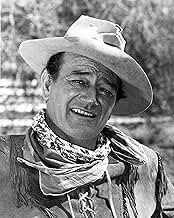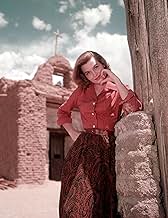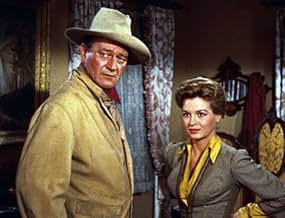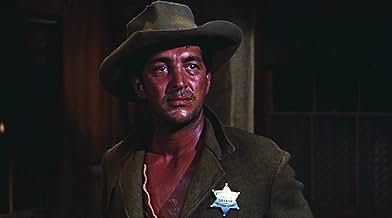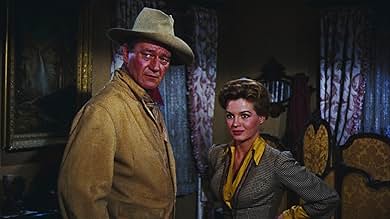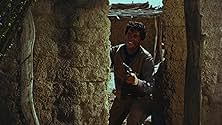Un shérif arrête le frère de l'homme le plus puissant de la région. Il n'a pour alliés qu'un adjoint ivrogne, un vieillard boiteux, un gamin, une joueuse de poker et un hôtelier mexicain, et... Tout lireUn shérif arrête le frère de l'homme le plus puissant de la région. Il n'a pour alliés qu'un adjoint ivrogne, un vieillard boiteux, un gamin, une joueuse de poker et un hôtelier mexicain, et contre lui une armée de tueurs.Un shérif arrête le frère de l'homme le plus puissant de la région. Il n'a pour alliés qu'un adjoint ivrogne, un vieillard boiteux, un gamin, une joueuse de poker et un hôtelier mexicain, et contre lui une armée de tueurs.
- Director
- Writers
- Stars
- Prix
- 4 victoires et 5 nominations au total
- Carlos Robante
- (as Pedro Gonzalez-Gonzalez)
- Jake (Stage Driver)
- (scenes deleted)
- Harold
- (scenes deleted)
- Cowboy
- (scenes deleted)
- Barfly
- (uncredited)
- Barfly
- (uncredited)
- Charlie
- (uncredited)
- Barfly
- (uncredited)
- Bartender
- (uncredited)
Avis en vedette
No character empathises this more than Dean Martin's broken down drunk Dude. Nicknamed "Borachon" by the Mexicans (Borachon is Spanish for "Drunkard") Dude battles with the demons that drove him to drink as he desperately tried not to let down Sheriff Chance, John Wayne, who believes in him more than he believes in himself. Dude's pouring back of a glass of bourbon into the bottle is one of the most life affirming scenes ever committed to film.
Wayne never really does anything other than play John Wayne and Hawks spins on this playing with the ethos of the man. The same steadfast values that mean Wayne's Sheriff John T. Chance will not release the prisoner Joe Burdette back to his murderous gang leave him stiff and awkward in front of Angie Dickinson's love interest "Feathers" creating perhaps the quintessential John Wayne movie in which the Jules Furthman and Leigh Brackett's screenplay explores the depths of the ideals that Wayne stands for. This is a movie about not just about redemption, but about the reasons for a tough redemption in a World in which collapse and lawlessness are easier options.
And when Dude pours his Bourbon back, affirming that even though he cannot be the man he was but he can still be a good man, you will not be wishing it was film in bullettime.
This is classic John Wayne at his finest. He is the great gunslinger facing insurmountable odds who takes on the bad guys with his brains, his determination, and his skills. Directed by Howard Hawks, this is just a great old fashion western. They even have Dean Martin and Ricky Nelson sing-along. Angie Dickinson plays the romantic lead. Sure, it is cliché. The good guys always win in the end. But there's nothing wrong with that.
Action western, an agreeable love story , shoot-outs at regular intervals , and humor abound in this magnificent film whose characters are splendidly portrayed . It packs larger-than-life roles , uproarious events and lively happenings . The Duke carries strong acting on his brawny shoulders and perfectly does . The picture is mainly lifted out by veteran Brennan's wonderfully acting as a half-crazed likable old man , whose finger itches demoniacally on the trigger every time he gets a nasty guy in his sights . And of course , top-drawer Dean Martin with an unexpected excellent performance as alcoholic sheriff . Colorful Technicolor cinematography by cameraman Russell Harlan who adds much to the setting of this unique Western. Marvelous musical score by Dimitri Tiomkin including the Mexican ¨Degueyo¨, music also played during ¨John Wayne's Alamo¨ siege. This overlong , too much-acclaimed and very gripping Western will appeal to John Wayne fans. Rating : Above average, essential and indispensable Western , a masterpiece horse opera whose reputation has improved over the years.
Subsequently , Howard Hawks shot ¨El Dorado¨ in similar style with a hot-headed James Caan as Mississipi who is a virtual retreat of the previous young sidekick named Colorado-Ricky Nelson . Howard Hawks also displays a number of similarities to the posterior ¨Rio Lobo¨ starring Wayne, Victor French, Jorge Rivero and again with an old short-tempered person played by Jack Elam . Furthermore, a semi-remake on modern times by John Carpenter was called ¨Assault on Precinct 13¨.
Rio Bravo is a sprawling pressure cooker. For anyone not used to the pacing of older films, this is not the best place to begin. Uninitiated audiences are likely to find it boring--the plot is relatively simple, and they would likely have a difficult time remaining with Rio Bravo for its 2 hour and 21 minute running time. It's best to wait until one is acclimated to this kind of pacing, so as not to spoil the experience. The film is well worth it.
John Wayne was an enthralling paradox, and maybe no film better demonstrates why than Rio Bravo. He had almost delicate "pretty boy" looks and a graceful gait that were an odd contrast to his hulking height and status as the "action hero" of his day. He speaks little, and doesn't need to, although he is the star and thus the center of attention. He tends to have an odd smirk on his face. Wayne's performance here interestingly parallels the pacing and tenor of the film--that's not something that one sees very often, or at least it's not something that's very easy to make conspicuous.
And he's not the only charismatic cast member. Dean Martin, Ricky Nelson, Walter Brennan and Angie Dickinson are equally captivating. Even when the full blow-out action sequence begins (and that's not until about two hours into the film, although there are a few great shorter action scenes before that), the focus here is still on the interrelationships between these characters, with Brennan the continually funny comic foil, Nelson the suave, skilled youngster, Martin the complex and troubled but likable complement to Wayne, and Dickinson as the sexy, forward and clever love interest.
Director Howard Hawks seems to do everything right. He guides cinematographer Russell Harlan in capturing subtly beautiful scenery--like the mountains in the distance over the tops of some buildings, and a great sunrise shot--and asks for an atmospheric score (such as the repeated playing of Malaguena by a band in the background) that shows that plot points weren't the only element of the film that influenced John Carpenter (who partially based his Assault on Precinct 13 (1976) on this film). But most intriguing is probably Hawks' staging/blocking. You could easily make a study of just that aspect of the film. The characters are always placed in interesting places in the frame, and they're constantly moving in interesting ways throughout the small collection of buildings and streets that make up the town. There is almost a kind of performance art aspect to it. Wayne, for instance, repeatedly touches base at the jail, then picks up his rifle, circles around to the hotel and back, almost as if he's doing some kind of western Tai Chi.
Rio Bravo is nothing if not understated, and as such, it may take some adjustments from modern, especially younger, viewers. But it's a gem of a film, and worth watching and studying.
Le saviez-vous
- AnecdotesThe sets in Old Tucson are built to 7/8th scale, so the performers look larger than life.
- GaffesAt night when Dude and Chance are making their rounds, the camera follows Dude as he walks briefly off the set. A huge concrete pillar that he walks past can be seen.
- Citations
Feathers: I thought you were never going to say it.
John T. Chance: Say what?
Feathers: That you love me.
John T. Chance: I said I'd arrest you.
Feathers: It means the same thing, you know that.
- ConnexionsEdited into La classe américaine (1993)
Meilleurs choix
Détails
Box-office
- Brut – à l'échelle mondiale
- 27 763 $ US
- Durée2 heures 21 minutes
Contribuer à cette page




